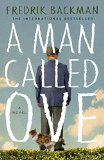Summary | Excerpt | Reading Guide | Discuss | Reviews | Beyond the book | Read-Alikes | Genres & Themes | Author Bio

In this bestselling and delightfully quirky debut novel from Sweden, a grumpy yet loveable man finds his solitary world turned on its head when a boisterous young family moves in next door. Winner of the 2014 BookBrowse Debut Novel Award.
Winner of the 2014 BookBrowse Debut Author Award
In this bestselling and delightfully quirky debut novel from Sweden, a grumpy yet loveable man finds his solitary world turned on its head when a boisterous young family moves in next door.
Meet Ove. He's a curmudgeon - the kind of man who points at people he dislikes as if they were burglars caught outside his bedroom window. He has staunch principles, strict routines, and a short fuse. People call him "the bitter neighbor from hell." But must Ove be bitter just because he doesn't walk around with a smile plastered to his face all the time?
Behind the cranky exterior there is a story and a sadness. So when one November morning a chatty young couple with two chatty young daughters move in next door and accidentally flatten Ove's mailbox, it is the lead-in to a comical and heartwarming tale of unkempt cats, unexpected friendship, and the ancient art of backing up a U-Haul. All of which will change one cranky old man and a local residents' association to their very foundations.
A feel-good story in the spirit of The Unlikely Pilgrimage of Harold Fry and Major Pettigrew's Last Stand, Fredrik Backman's novel about the angry old man next door is a thoughtful and charming exploration of the profound impact one life has on countless others.
BookBrowse note: In Swedish Ove is pronounced (approximately) Oover.
A Man Called Ove is a perfect selection for book clubs. It's well written and replete with universal concerns. It lacks violence and profanity, is life-affirming and relationship-driven. The book is bittersweet, tender, often wickedly humorous and almost certain to elicit tears...continued
Full Review
 (496 words)
(496 words)
(Reviewed by Linda Hitchcock).
A Man Called Ove inexorably links the man and his cherished Saab. Ove's first vehicle, inherited from his father at age 16, was a restored green 1949 Saab '92, a two-door coupe, the distinctive Swedish automobile manufacturer's first production car. Ove's devotion and brand loyalty to the company's Swedish roots is so steadfast that he ceases purchasing new cars after the General Motors acquisition, choosing instead to retain his dark blue 1998 Saab 9.5 Estate model.
IOne can argue that a Saab is not a car, but a wingless, non-flying airplane. The Svenska Aeroplan Aktiebolaget (Swedish Airplane Corporation) factory was built in 1938 to provide equipment for the Royal Swedish Air Force. Throughout World War II, the company manufactured ...

If you liked A Man Called Ove, try these:

by Camilla Barnes
Published 2025
An often hilarious, surprisingly moving portrait of a long-married couple, seen through the eyes of their wickedly observant daughter—for fans of A Man Called Ove and The Royal Tenenbaums.

by Shelby Van Pelt
Published 2025
Winner of the 2022 BookBrowse Debut Award
For fans of A Man Called Ove, a charming, witty and compulsively readable exploration of friendship, reckoning, and hope that traces a widow's unlikely connection with a giant Pacific octopus.